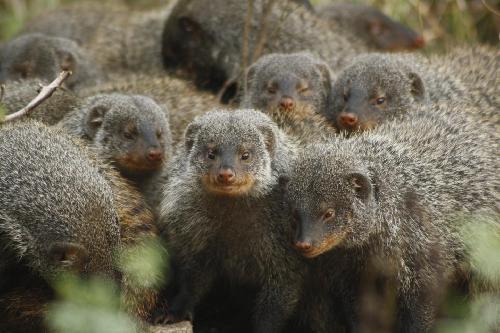Intense levels of reproductive competition trigger violent evictions of male and female banded mongooses from their family groups, University of Exeter researchers have found.
Dominant animals in this species are unable to stop subordinates breeding, leaving them with no resort except to throw them, kicking and screaming, out of the group.
Scientists observed a population of wild banded mongooses in Queen Elizabeth National Park in south west Uganda in a 16 year study. They found that evictions were extremely aggressive events resulting in the forcible expulsion of a group of females, sometimes with a group of males alongside them.
 This is a banded mongoose group. Credit: Faye J Thompson.
This is a banded mongoose group. Credit: Faye J Thompson.
These mass eviction events were most likely to occur when the level of competition over who reproduces was at its greatest. Female banded mongooses were evicted when there were lots of breeding females in the group, and males were more likely to be evicted alongside females when there were lots of males competing to breed.
Banded mongooses live in cooperatively breeding family groups, meaning that all group members help to raise pups even if they don't breed themselves. All adult females breed together, giving birth to a communal litter on exactly the same day. Usually individuals live together peacefully but occasionally the group erupts into violence, which results in some individuals being aggressively attacked and driven away from the group.
The study, published in the journal Proceedings of the Royal Society B, shows that reproductive competition destabilises cooperative groups and that eviction can be a major source of gene flow in social animals.
Faye Thompson, a PhD researcher at the University of Exeter's Centre for Ecology and Conservation and the lead author of the study, said: "Banded mongooses, like many social animals, often show extreme levels of cooperation but occasionally these harmonious relations break down. Dominant females, and sometimes males too, aggressively evict members of their own family to reduce their level of reproductive competition.
"Banded mongooses rarely disperse of their own accord, and so eviction is one of the only ways that individuals form new groups. These eviction events result in the mass movement of genes through the population."
Professor Michael Cant from the University of Exeter's Penryn Campus, Cornwall, who leads the Banded Mongoose Research Project, said: "We've been studying these animals for 20 years, but it's only now that we are beginning to understand the long-term dynamics of the system. This work shows that within-group conflicts can have effects not only on the individuals involved, but also on the genetic structure of the wider population."
source: University of Exeter